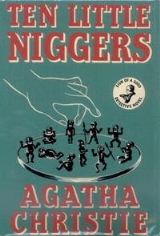
Nigger
WordNet
noun
(1) (ethnic slur) extremely offensive name for a Black person
"Only a Black can call another Black a nigga"
WiktionaryText
Etymology
Ultimately from the adjective niger, meaning "black". Several Romance languages (Italian, Spanish, Portuguese, etc) have the word "negro" meaning "black" (in colour) derived from the Latin "niger", while French has , its nègre being borrowed from Spanish. During the period in America's history when black workers were shipped to America to work as slaves, this word came to be adopted from the Hispanic South American languages to describe a person of dark skin. Essentially, a "negro" person simply means a "black" person. Through constant repetition of the Spanish word in the American accent, it seems likely that the word was corrupted from "negro" to "niggero" to simply "nigger".
Noun
- A dark-skinned person, especially a person of, or primarily of, Negro descent.
- Huckleberry Finn, in the eponymous novel by Mark Twain.
- It was fifteen minutes before I could work myself up to go and humble myself to a nigger; but I done it, and I warn't ever sorry for it afterwards, neither. I didn't do him no more mean tricks, and I wouldn't done that one if I'd a knowed it would make him feel that way.
- 1888, Rudyard Kipling, ‘On the City Wall’, In Black and White, Folio Society 2005, p. 435:
- The Captain was not a nice man. He called all natives ‘niggers’, which, besides being extreme bad form, shows gross ignorance.
- Hotel Rwanda
- You are not even niggers, you are Africans.
- Huckleberry Finn, in the eponymous novel by Mark Twain.
- A person of Negro descent who acts in an unapproved manner, usually as a badass.
- I love black people, but I hate niggers.
- Informal term of address.
- 2002, Earl Ofari Hutchinson, "Loaded Language", a review of Nigger: The Strange Career of a Troublesome Word by Randall Kennedy, Washington Post, Sunday, January 13, 2002; Page BW06
- I had overheard him greet a buddy who called him on the phone with "Yo, nigger, what's up?"
- 2002, Earl Ofari Hutchinson, "Loaded Language", a review of Nigger: The Strange Career of a Troublesome Word by Randall Kennedy, Washington Post, Sunday, January 13, 2002; Page BW06
Usage notes
"Nigger" has taken on pejorative qualities, as it implies not only darkness of skin, but a general lack of intelligence and sophistication. At the time of the word's origin, various English-speaking North American settlers who set cultural standards considered black people fundamentally inferior and less civilized than white people. The term is generally considered offensive to black people, not only because it singles them out on the basis of their skin colour, but also because, due to its origin, it carries connotations of slavery, inferiority and oppression.
The term is generally derogatory when used by persons not of African descent (and sometimes when used by persons of African descent), but, it is also used by some black people among themselves, positively, especially when used in the form of "nigga," in a form of reclamation. It is important to note that many people do not believe that "nigger" is able to be reclaimed, because of its fraught history and continued pejorative usage. Usage by non-blacks, however, is almost invariably considered offensive. Thus, the term is both potentially liberatory while also being highly contested.
In its pejorative sense, it arguably ranks as the most insulting racial epithet in the English language, with strong connotations of cultural and intellectual inferiority or deficiency. The controversial nature of the word makes it unacceptable for use in most modern mainstream American media. The word is usually censored in direct quotations or euphemistically referred to as the "n-word" to blunt its potential negative impact.

